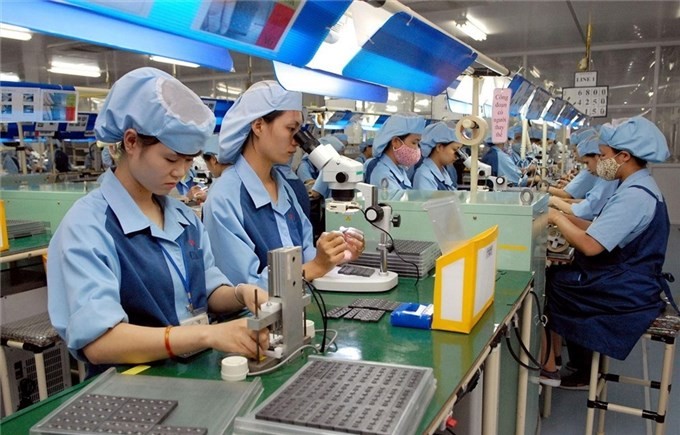
Vietnam's economy in 2023 promising yet challenging: Experts
Latest
 |
| 2023 could be a year of great opportunities to solidify the importance of Vietnam as a strong economy of the region. (Photo: Lao Dong) |
Interest rates and inflation outlook
As the Russia-Ukraine conflict rages on, energy prices will remain volatile, which will have an implication to domestic prices due to the products Vietnam imports.
“We do not expect domestic consumption to increase substantially this year, which should reduce upward pressure on prices too,” Dr Daniel Borer, Interim Program Manager of Global Business, RMIT University (Australia) commented.
This year’s inflation may, nonetheless, experience upward pressure due to a possible, stronger depreciation of the VND as capital may flow out of Vietnam, seeking to benefit from the increased interest rates in other currencies like the euro or US dollar.
“This would make imported goods more expensive, which are part of the consumer basket of average Vietnamese households,” Dr Borer added.
Dr Ha Thi Cam Van, course coordinator for Macroeconomics at RMIT Vietnam shared that this tendency may be offset due to domestic interest rate increases which are already happening and are expected to continue to be raised to up to 15% for fixed/term deposits offered by private banks.
“The interest rate increases this year will continue to put pressure on the real estate market, where demand is dwindling due to increasing mortgage rates,” said Dr Van.
For investors into real estate, as sellers will be slow to adjust their prices downwards as a response to the demand decrease, it may be advisable to wait until the second quarter of 2023 to benefit from a better bargaining position.
The two experts expected the State Bank of Vietnam to maintain inflation rates below 5% for this year, which would add to their success as guardian for price stability.
Exchange rates, trade and FDI
Keeping prices stable will also reduce the depreciation of the exchange rate. A simplistic forecasting model suggests that inflation differentials of currencies represent the expected change in the exchange rate.
Dr Borer shared that while this relation is true in the long run but not on a year-by-year basis, the moderate inflation of the VND should keep depreciation pressure of the domestic currency at bay.
“Looking at the last 20 years, the VND has inflated by 4.3% more than the USD annually, which should translate into a gradual depreciation of the VND towards the USD of this amount”, Dr Borer analysed.
Hence, to create a more stable trade environment and reduce market uncertainty, Dr Borer and Dr Van suggest a gradual depreciation band of 3-4% to be introduced for the VND versus the USD. They believe that this system could add stability and promote exports for Vietnam.
Dr Van explained: “The export sector could need any help it can get, as the main export markets, namely the US with one third of all Vietnamese exports and the EU, just entered recessions. China, the second largest customer of Vietnamese export goods, is also not in a good shape for 2023, though it may not enter a recession yet.
“Although exports were growing greatly in 2022 by approximately 10.6% from 2021, with seafood and textiles achieving record heights, this will not be the case for this year.”
FDI also rose in 2022 achieving a 5-year height with 22.4 billion USD disbursed. The main investing countries are typically Singapore, South Korea, and Japan – regional partners taking advantage of cheap labour costs in Vietnam.
Dr Borer emphasised that while low labour wages are attractive in the short and medium run, a growing economy will eventually translate into higher GDP per capita, and hence, higher labour costs.
“This is desirable, as it represents increased wealth for citizens. Hence, it is high time for Vietnam to seriously identify and build strengths in other aspects beyond low salaries.
Building a reliable, safe, eco-friendly, and stable economic environment will be the key for sustained future growth, which will attract FDI despite of increasing domestic wages.
To this end, Dr Van indicated that focus should be put on: combatting corruption at all levels, increasing transparency of policy decisions, strengthening the environmental efforts.
Furthermore, increasing transparency, for example as mentioned earlier with a clear ruled depreciation rate of the currency, will make Vietnam a more reliable and trustworthy partner for trade.
Lastly, according to Dr Borer, foreign consumers are becoming more sensitive and inquiring about how environmentally friendly, or unfriendly, the products they buy are. With 53% of energy coming from coal plants, Vietnam is still a long way from becoming environmentally friendly. Aspects like these will soon deter FDI.
Dr Borer also shared: “Any possibility to reduce energy consumption as well as making energy greener needs to be explored. One key item on the agenda is to build mass rapid transport systems to reduce the usage of vehicles in HCMC and Hanoi.”
Furthermore, the national cargo train system needs attention to reduce reliance on trucks which would also decongest traffic and, make Vietnamese products more environmentally friendly.
“Even policy recommendations like changing the time zone to GMT+8, as outrageous as they seem, would reduce energy usage as well as align the country closer to the main trading partners in the region”, Dr Borer said.





















